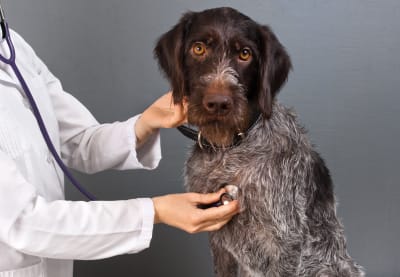What is pneumonia in dogs?
Just like us, our dogs can develop pneumonia that impacts the respiratory system, interfering with your pooch’s ability to breathe regularly. While some forms of pneumonia take more time to clear up than others, most dogs recover well with treatment.
That said, the condition can lead to serious issues if left untreated.
What is infectious pneumonia?
Infectious pneumonia (also known as bacterial pneumonia) is the most common type of pneumonia in dogs. The condition is caused by a bacterial or viral infection in your dog’s airways.
One of the bacteria most commonly linked to infectious pneumonia in dogs is bordetella bronchiseptica, and it can easily be transmitted between dogs very young or senior dogs with a compromised immune system.
What are symptoms of infectious pneumonia in dogs?
If your dog is suffering from infectious pneumonia, one or more of the following symptoms may appear:
- Difficulty breathing
- Lethargy
- Nasal whistling
- Wheezing
- Coughing
- High fever
- Runny nose
- Difficulty exercising
- Loss of appetite
- Weight loss
- Irregular breathing
- Dehydration
If your dog has been diagnosed with infectious pneumonia, you’ll want to keep your ill dog away from other household pets and wash bedding, collars, leashes and bowls frequently to avoid spreading the condition.
Also wash your hands immediately after handling or petting a dog with infectious pneumonia.
What is aspiration pneumonia in dogs?
If your dog has an abnormality of the pharynx, a neuromuscular disorder that impacts respiratory function or accidentally inhales medication or vomit, he could develop aspiration pneumonia.
In some circumstances, acid reflux can lead to frequent regurgitation, and an enlarged lower esophagus, which can lead to aspiration pneumonia. An incorrectly placed feeding tube can also be a culprit.
What are signs of aspiration pneumonia?
Symptoms of aspiration pneumonia can be very similar to infectious bacterial pneumonia, and may include one or more of these:
- Irregular breathing
- Weight loss
- Appetite loss
- Dehydration
- Difficulty exercising
- Wheezing
- Lethargy
- Nasal whistling
- High fever
- Difficulty breathing
- Runny nose
- Coughing
However, aspiration pneumonia may also lead to other symptoms, including:
- Frequent regurgitation
- Bluish colored skin
- Altered mood
- Difficulty swallowing
If any of these signs appear in your dog, contact your vet immediately to book an appointment. Early diagnosis and treatment may help prevent more severe symptoms from developing, which can be more difficult to treat.
How is pneumonia in dogs treated?
Veterinarians will typically prescribe medications for diagnoses of aspiration or bacterial pneumonia.
Medications such as nonsteroidal anti-inflammatory medications for pain and fever, and bronchodilators and expectorants for coughing and breathing issues may be necessary.
For a severe case of pneumonia, your dog may need to be hospitalized and given supplemental oxygen, fluid therapy or intravenous antibiotics.
How can I help my dog recover from pneumonia?
Your vet will provide you with specific instruction on caring for your dog with pneumonia throughout their recovery. Typical instructions for care can include:
- Keeping other pets and small children away from your dog so they can get plenty of rest.
- Restricting your dog’s activities while they recover.
- Using a steam treatment by running a hot shower to treat your dog, while you sit with him in the shower room or bathroom.
- Supplying lots of fresh water to keep them hydrated.
Note: The advice provided in this post is intended for informational purposes and does not constitute medical advice regarding pets. For an accurate diagnosis of your pet's condition, please make an appointment with your vet.
Is your dog exhibiting signs of pneumonia? Contact your vet or the nearest emergency animal hospital. At Animal Hospital of Clemmons, we provide preventive and emergency veterinary care for cats and dogs in Clemmons and greater Winston-Salem.
Looking for a vet in
Clemmons?
We're always accepting new patients, so contact our veterinary hospital today to book your pet's first appointment.
Related Articles View All
How often do you take a cat to the vet?
Regular checkups including vaccines and parasite control play a key role in helping your kitty achieve a long and healthy life. So, how often should you take a cat to the vet? Today we share general guidelines recommended by most veterinarians.
Exploring Cat Dental Health - Gingivitis
Is your cat refusing to eat, or losing weight? It could be due to a dental health problem such as gingivitis. Read on to learn about the signs and how gingivitis in cats can be treated.
The Best Way to Travel With a Cat
Planning a trip away from home and want to take your feline friend along with you? Here are a few helpful tips from our Clemmons team to help make the journey an enjoyable experience for both you and your cat.
Kitten First Vet Visit - What to Expect & What it Will Cost
Have you welcomed a beautiful new kitten into your heart and home? If so, early veterinary care can help to set your tiny fur baby on the path to excellent life-long health. Today, our Clemmons vets discuss kitten first vet visits.
How to Tell if Your Cat Has a Broken Leg
Regardless of whether your cat is a curious outdoor explorer or a chilled-out homebody, accidents can happen. Today, our Clemmons vets share signs that may indicate that your cat has a broken leg, and what you should do.

